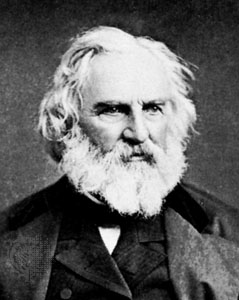Henry Wadsworth Longfellow Quotes

In old age our bodies are worn-out instruments, on which the soul tries in vain to play the melodies of youth. But because the instrument has lost its strings, or is out of tune, it does not follow that the musician has lost his skill.
Henry Wadsworth Longfellow
(Table Talk, 1857)
Talk not of wasted affection, affection never was wasted;
If it enrich not the heart of another, its waters, returning
Back to their springs, like the rain, shall fill them full of refreshment;
That which the fountain sends forth returns again to the fountain.
Each day is a branch of the Tree of Life laden heavily with fruit. If we lie down lazily beneath it, we may starve; but if we shake the branches, some of the fruit will fall for us.
The holiest of all holidays are those
Kept by ourselves in silence and apart;
The secret anniversaries of the heart,
When the full river of feeling overflows.
There are moments in life, when the heart is so full of emotion That if by chance it be shaken, or into its depths like a pebble Drops some careless word, it overflows, and its secret, Spilt on the ground like water, can never be gathered together.
Ah! this beautiful world ... Indeed, I know not what to think of it. Sometimes it is all gladness and sunshine, and heaven itself lies not far off. And then it changes suddenly, and is dark and sorrowful, and clouds shut out the sky. In the lives of the saddest of us, there are bright days like this, when we feel as if we could take the great world in our arms. Then come the gloomy hours, when the fire will neither burn on our hearths nor in our hearts; and all without and within is dismal, cold, and dark.
The little I have seen of the world and know of the history of mankind teaches me to look upon the errors of others in sorrow, not in anger. When I take the history of one poor heart that has sinned and suffered, and represent to myself the struggles and temptations it has passed—the brief pulsations of joy—the feverish inquietude of hope and fear—the tears of regret—the feebleness of purpose—the pressure of want—the desertion of friends—the scorn of the world, that has little charity—the desolation of the soul’s sanctuary, and threatening voices from within—health gone—happiness gone—even hope, that stays longest with us, gone,—I have little heart for aught else than thankfulness that it is not so with me, and would fain leave the erring soul of my fellow-man with Him from whose hands it came.

